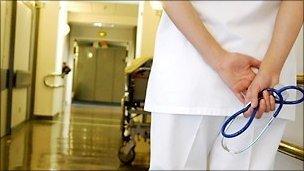Spending Review: Why the NHS will still feel the pain
- Published

The NHS is still having to make savings despite the rise in funding
The NHS will stand out like a sore thumb this week. While the rest of the public sector faces the longest and deepest round of cuts in history, ministers will announce an increase in the health budget in England.
The health service is one of only two departments - the other is overseas development - to get such a guarantee.
And with a £100bn-plus budget - the equivalent of defence and education combined - the move has proved controversial.
Even Labour, the self-appointed guardians of the health service, could not offer such a promise in the run-up to the general election.
Meanwhile, the grumblings of discontent among other departments have been getting louder and louder in the lead-up to the Spending Review.
Some policy experts have also argued that the move sends out the wrong signal - that efficiency in the health service is not important.
Top priority
But within the NHS, it is a different story. Doctors, nurses and managers have been complaining the service faces its toughest period for a generation. So how can this be?
The NHS has always enjoyed higher budget rises than other departments. Historically, the funding has increased by more than 4% a year - and in the past decade that has averaged more than 6%.
This is in recognition of the high priority placed on the health service - it often comes out top in public surveys - as well as the pressures it faces from factors such as obesity, new drugs and the ageing population.
Just to keep pace with these, experts claim the NHS needs an extra 3% each year over and above inflation.
This is why even a small rise - the most the NHS can probably expect in real terms is 1% - will cause problems.
Nigel Edwards, acting head of the NHS Confederation, which represents health trusts, says the situation threatens a "potent cocktail of financial pressures".
Preparations have already started to be made.
Last year, NHS chief executive Sir David Nicholson warned the health service would have to make up to £20bn of efficiency savings by 2014 - the equivalent of productivity gains of up to 5% a year.
However, that remains a significant challenge for a service which has been getting less productive over the past decade.
The early signs are that instead of looking to change the way it works, the NHS is resorting to "slash and burn" tactics, according to unions.
They believe job cuts are already being made - latest estimates suggest 10,000 posts have gone in recent months.
This, of course, has a knock-on effect, with reports of community services such as district nursing suffering, and increasing restrictions on hospital treatments.
The NHS may also have to deal with the added complication of its remit expanding.
Earlier this month, the government announced £70m of this year's budget would be shifted into rehabilitation services to provide better care for people being discharged from hospitals.
Traditionally, patients such as elderly falls victims would be handed over to social services. But ministers are now urging the NHS to provide free six-week packages of support.
More of this is likely in the coming years, with campaigners urging £400m of NHS funding to be set aside to aid council social care departments.
Teenage pregnancy, which has been shared with the Department for Education, is another area where the NHS may find itself with more of a role.
And if that is not enough, the NHS will be doing all this in the middle of a major reorganisation.
By 2013, the government wants GPs to take responsibility for managing the health service.
This in itself will cost an estimated £2-3bn as well as leading to the upheaval of structures as the 151 primary care trusts are phased out.
None of this will stop the rights and wrongs of the NHS guarantee being discussed. And nor should it. But what is certain is that the NHS is facing a far from easy ride.
- Published7 July 2010